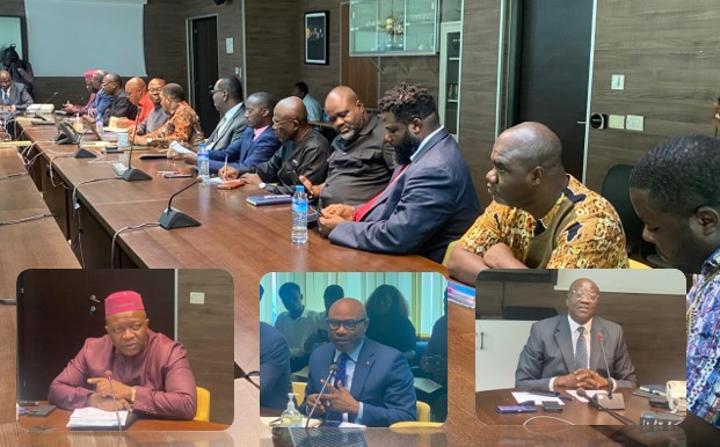Africa-Press – Liberia. The Central Bank of Liberia (CBL) has announced plans are underway to launch s national electronic payment switch aimed at enhancing banking efficiency, expanding financial inclusion, and transitioning Liberia toward a cash-light economy. He said the switch will be fully operation by December this year.
CBL Executive Governor Henry F. Saamoi, speaking Wednesday at the Bank’s headquarters during the presentation of the Monetary Policy Committee (MPC) Communiqué, described the initiative as a game-changer for the country’s financial system.
“We can’t be left behind,” Saamoi emphasized. “We’re coming to the table late, but we have to get there.”
The switch, also known as a payment switch, will serve as a centralized digital hub to route and process electronic transactions between banks, mobile money operators, and other financial service providers. It will enable interoperability among various platforms—allowing customers to use a single card or payment tool across all ATMs and point-of-sale (POS) terminals nationwide.
“Currently, if I have a card issued by Ecobank and their ATM is down, I can’t use it on LBDI’s ATM,” Saamoi said. “The switch will bridge that gap—so one card can work everywhere. That’s the ecosystem we are building.”
Toward a Cash-Light, Transparent Economy
Governor Saamoi said the switch would offer real-time visibility into financial data, especially for mobile money platforms. This visibility, he said, will eliminate data manipulation and improve transparency in revenue generation—vital for national development.
“If everyone has access to digital services, why should someone travel from Paynesville to Sinkor just to make a transaction? You should be able to do that from your phone, at home.”
He added that the switch would pave the way for innovation, allowing banks to reassign staff from basic cash-handling roles to more productive services. “This is how we begin modernizing our financial system,” he said.
Governor Saamoi stressed that while the long-term goal is a fully cashless economy, Liberia will begin with a cash-light model, minimizing physical cash transactions while strengthening digital infrastructure.
Policy Stability and Growth Outlook
Meanwhile, the MPC announced it will maintain the monetary policy rate at 17.25%, citing improved inflation trends and relative exchange rate stability. The policy corridor and reserve requirement ratios for both Liberian and U.S. dollar deposits remain unchanged.
The MPC noted positive signs such as declining consumer prices and stable net foreign inflows supporting the Liberian dollar. However, it warned of external risks and vowed to remain vigilant.
“Maintaining macroeconomic stability is non-negotiable,” Governor Saamoi declared.
Stakeholders Voice Support
The announcement drew praise from key players in Liberia’s financial ecosystem. Attendees included representatives from the Bankers Association of Liberia, Liberia Marketing Association, Liberia Business Association, academia, and civil society.
Augustine Ngafuan,Minister of Finance and Development Planning addressing the gathering, applauded the CBL’s efforts and called for deeper coordination between fiscal and monetary authorities.
“We must execute. We must deliver. And we must deliver on time,” Ngafuan said.
He acknowledged recent improvements in inflation and food prices but warned of falling global prices for Liberia’s key exports such as rubber, cocoa, and palm oil. He also hailed the launch of the Pan-African Payment and Settlement System (PAPSS), which allows cross-border trade in local currencies without U.S. dollars.
“If someone in Liberia can pay for goods in Ghana without U.S. dollars, that’s not just convenience—it’s transformation,” Ngafuan said.
Bankers Association: Time for Action
Olalekan Balogun, President of the Liberia Bankers Association, said the time was long overdue for the launch of the electronic switch.
“It’s unthinkable that Liberia hasn’t implemented this already,” he said.
Balogun urged authorities to ensure both the Liberian and U.S. dollar are usable in PAPSS and stressed that policies should be designed to encourage—not merely suggest—digital adoption.
“Digitization helps fight corruption. You can trace every payment,” he said. “We, the banks, are ready to support. We’re like conjoined twins with the CBL. But let’s push each other forward—this system must work.”
For More News And Analysis About Liberia Follow Africa-Press






